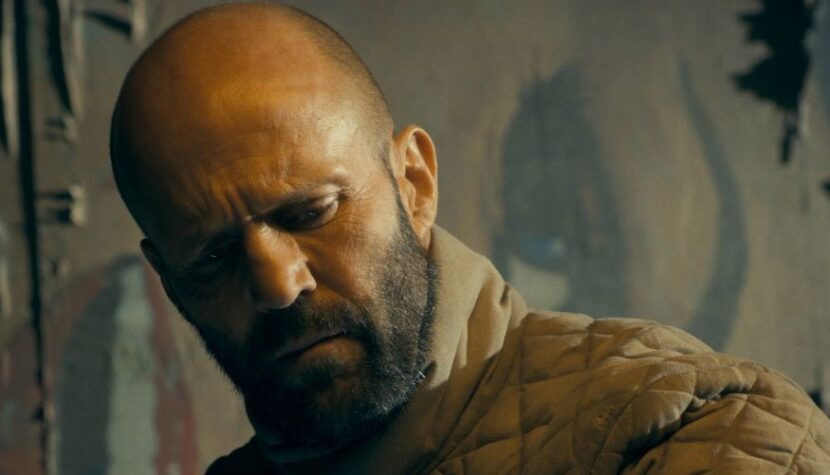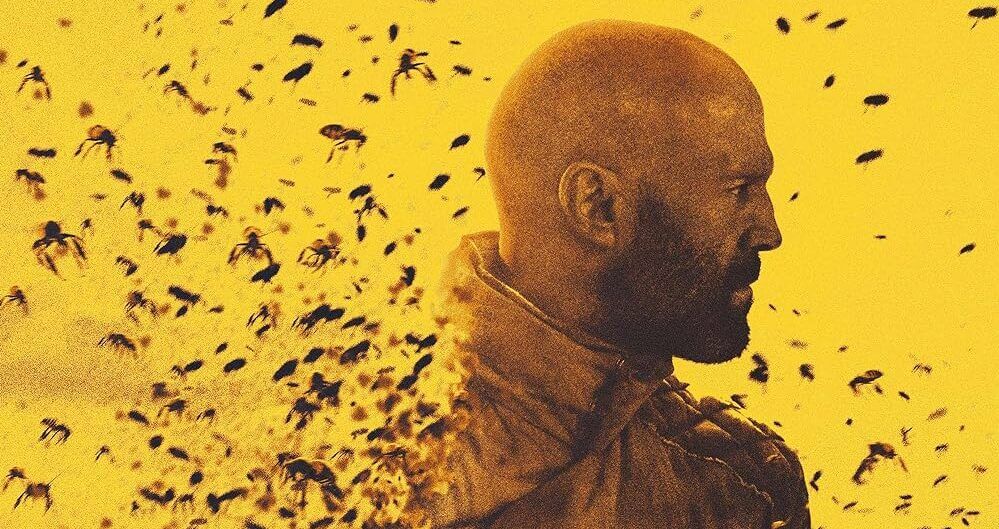THE BEEKEEPER. Bee Killers Squad [REVIEW]

How interesting can films be shortly after the audience has been spoiled with four parts of John Wick? Unfortunately, I don’t come with an answer to that question. For a dazzlingly executed work in this genre, it seems we’ll have to wait. However, I can emphatically point out one of the sensations opening the year 2024, which is a notorious example of how such cinema should not be realized. Do you dislike action films from the first decade of the 21st century with choppy and shaky cinematography? Does it make you nauseous to watch more works from Michael Bay or Zack Snyder? In such cases, The Beekeeper directed by David Ayer may turn out to be a depressing trauma for you.
Without mercy and without moderation, The Beekeeper opens with a stylish opening sequence. Mystical manuscripts dissecting the significance of bees in the ecosystem are juxtaposed with geometrically planned skyscrapers, corporate structures, and overwhelming power. The micro-scale of social networks contrasted with the macro-scale immediately establishes the theme of The Beekeeper. It is a move as classic as it is promising. In the first scenes, we experience the honeyed idyll of the main character, Adam Clay, played by the weary Jason Statham. On a peaceful farm, he spends a quiet period of his existence with a likable older lady under his care. The evil that befalls the mentioned woman forces the hero to take matters into his own hands. However, as the story progresses, The Beekeeper’s foundations seem to be placed rather firmly in the first scenes. The problem is that the longer the film lasts, the more it becomes apparent that the director is not interested in them, setting them aside like unnecessary building blocks. Departing from a safe structure, he indulges excessively in technically messy demolition of the male playground. He contradicts the previously established logic of the world, leaving it constantly in lazy ambiguity. In the second half of the film, any illusions can be dispelled. The Beekeeper offers a noisy and dull audio-visual mess, chopped up on the editing table. The content of the final sequences of the film can be described in one word: destruction. Simultaneously, the same word corresponds to what happens to an amateurish and weak script by Kurt Wimmer (also responsible for last year’s The Expendables 4), based on borrowings from better productions. In the final scenes, the tortured Statham seems to express a depressive statement with his facial expressions alone: the world is an irreparably bad place. What is stronger, however, is the feeling of unfulfilled assumptions that the screenwriter established at the very beginning of the film. Precision as an element of the author’s strategy is perhaps the last noun that can describe the inflated, gravity-free mass of mindless violence that the creative team has to offer.

Of course, it seems that Statham’s silhouette on the poster immediately suggests the type of experience we will have. It’s about pure entertainment, a tough guy craving revenge who will decimate opponents with his even tougher fists. That’s enough, right? Not necessarily, when the director’s ambitions are disproportionate to his skills. In this divided vision, Statham tries to embody the character he plays. The beekeeper’s creation could be close to the role he successfully portrayed in The Transporter. However, regardless of the assumptions, the on-screen character lacks an ounce of consistency and character fulfillment. In some scenes, The Beekeeper turns out to be a silent assassin and then appears as an unsympathetic killing machine. In another, he commits spectacular crimes and then throws empty phrases based on metaphors related to the world of bees. This character split is not intriguing; it makes him one of Statham’s worst screen characters, with no chance of gaining audience sympathy.
In the circle of evil, David Ayer wanted to make a film that would show the layered complexity of evil. He wanted to somehow expose reality, showing that it is like a locust-infested beehive; diagnosing American dirt became his main goal. As a result, we get only symptoms without interpretation. Nevertheless, it is the wicked characters that are given the most space here. Every head of the cybercriminal department is an annoying showman, and other colorful enemies are taken straight from tacky B-movies. In vain, one looks for the serious diagnosis of evil promised by Ayer, and at the same time, it is not creative or in any way original. Jeremy Irons is the most defended from this group, trying to keep his creation in check. Nevertheless, even to such a renowned actor, it is difficult to hide the fact that he is a superfluous element in this intrigue. In the final act of The Beekeeper, the swirling sensation intertwines with dramatically intensified dialogues hastily served by corrupt villains. At this stage, we are simply tired of this hyperbole – there is a lack of breath and lightness.

During the interaction with The Beekeeper, one may be surprised by how many common elements it has with Suicide Squad, David Ayer’s infamous project taken from him by the studio. Unfortunately, the director’s latest work makes it clear that he is not an artist with a vision or even a skilled craftsman. Not deciding unequivocally on either gloomily elevated or escapist convention, he created a chaotic mirage of successive acts of sadism, stylistically late by a good decade. He shares excessive music video-style with Zack Snyder and admiration for mindlessly multiplying elements of spectacle with Michael Bay. Verdict: Statham still wants it, technical experts in action films still don’t want it, and Ayer’s fulfillment in his further career is difficult to predict at the moment. The Beekeeper is an overblown directorial and editing mishmash, whose incompetence intensifies with each passing minute of the screening.

